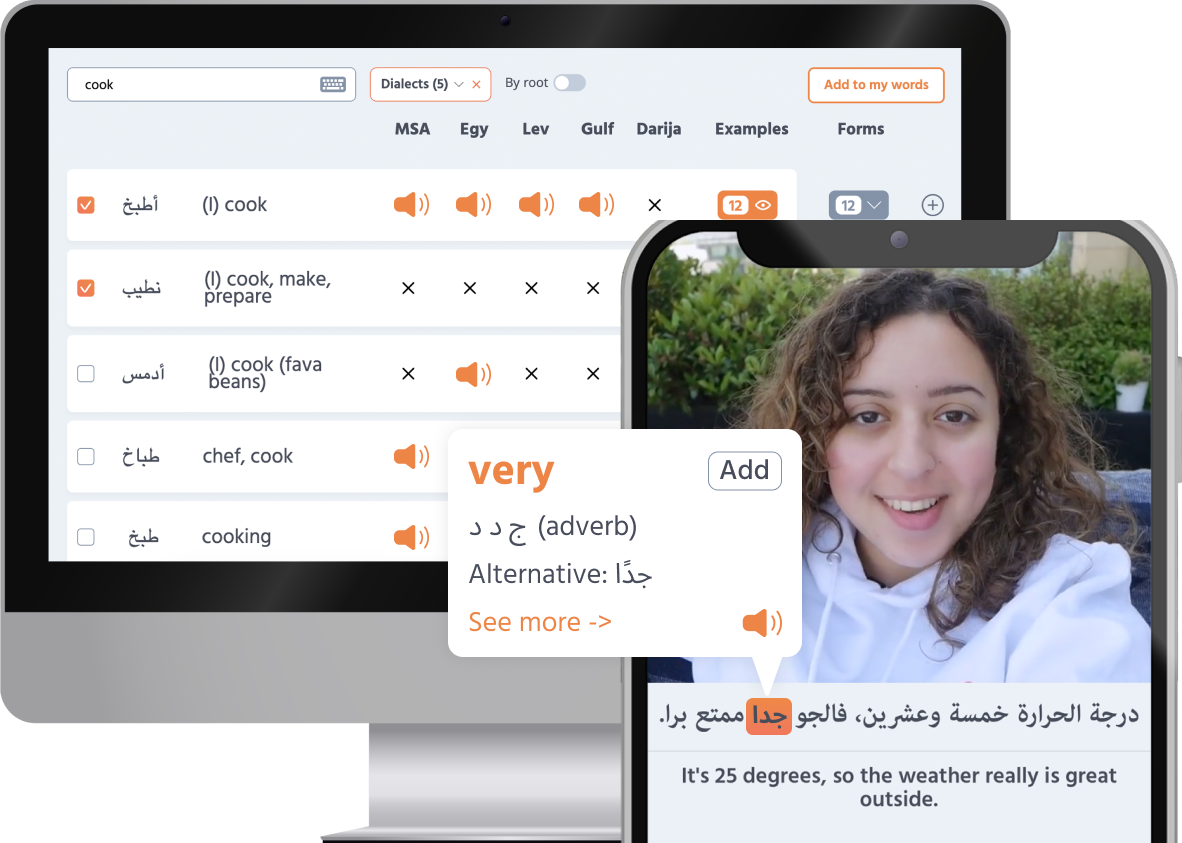Arabic is one of the most challenging languages in the world, but don’t be discouraged or leave the blog just yet—learning Arabic is definitely not impossible. However, it’s crucial to have realistic expectations before you start. Don’t be misled by commercial advertisements claiming that you can learn a new language in just an hour or a week.
This is precisely why we started our blog with this statement—to set more realistic expectations and, of course, not to discourage you.
As for how long does it take to learn Arabic, it certainly varies from person to person, depending on several factors , including which type of Arabic you want to learn—whether it’s Standard Arabic or one of the Arabic dialects.
Factors that influence how long it takes to learn Arabic How long it will take to learn Arabic differs from one person to another and depends on various factors including:
Language Experience: If someone is bilingual or multilingual, learning a new language can be easier and quicker.
Dedicated Study Time: The number of hours dedicated to studying Arabic will undoubtedly affect how quickly you learn, with daily learners progressing much faster than those who study weekly, for example.
Learning Method : The method of learning greatly influences how quickly you can learn Arabic. Online platforms like Playaling offer more efficient learning compared to traditional classroom settings because they allow for flexible study times and opportunities to review materials anytime and anywhere.
Learning Goals: It’s important to determine your goals for learning Arabic and the proficiency level you aim to achieve, as strong motivation is one of the key factors for successful and fast language learning.
Exposure to the Language: The more you are exposed to the language outside of study times—such as listening to Arabic songs, watching Arabic programs, or speaking with native speakers—the more it will enhance your learning experience and reduce the time needed to learn Arabic.
Type of Arabic: Learning Classical Arabic or Modern Standard Arabic generally takes longer than learning one of the Arabic dialects due to the complexity of Arabic grammar and verb conjugations. However, if you learn Modern Standard Arabic first, you then have a very strong foundation from which to move on to a vast array of dialects.
If you haven’t decided yet, you might want to check out the article, “Choosing an Arabic Dialect: Which Should You Learn? ” Then, return to this blog post to learn more about how long it will take.
Get free Arabic videos with interactive captions for your level
Get free videos
How long does it take to learn the Arabic language? According to the Foreign Service Institute (FSI), Arabic falls into Category V in their language difficulty ranking. An English speaker would need about 88 weeks, or 2200 hours , to reach an advanced level (B2/C1) on the Common European Framework of Reference for Languages.
This is the time required to learn Modern Standard Arabic, whereas if you want to learn one of the local Arabic dialects, learning a specific dialect generally requires less time than MSA, and how long will it take to learn Arabic depends on your dedication, effort, and consistency. The dialects generally take less time to learn because they are designed that way. They streamline complicated grammar into a form of the language more easily and quickly communicated.
How to quickly master Arabic? Here’s how you can learn Arabic effectively and efficiently:
Learn the basics of the language Alphabet and Pronunciation: Begin by learning the Arabic alphabet and how to pronounce each letter. Pay special attention to sounds that are unique to Arabic and don’t exist in English.
Choose the appropriate dialect Your choice between learning MSA or a local dialect should align with your reasons for studying Arabic. Initially, it’s wise to focus on one dialect to keep your learning directed and manageable.
We offer to help you learn the Arabic dialects, Modern Standard Arabic, or Educated Spoken Arabic in these pages:
Utilize suitable learning resources The resources you choose are key to your success. Select materials that are reliable and engaging to make the learning process enjoyable and to avoid boredom. For instance, Playaling offers interactive learning tools, real-world videos , a cross-dialectical Audio Dictionary , games, and exercises that enhance the learning experience.
Additionally, using books can be particularly helpful for practicing reading and deepening your understanding of Arabic grammar, especially useful if you’re focusing on MSA or classical Arabic.
Incorporate multimedia resources Listening Practice:
Speaking Practice:
Engage in Arab culture Immersing yourself in Arab culture greatly enriches your learning experience. Understanding cultural aspects provides context to the language and makes learning more engaging. Platforms like Playaling are excellent for exploring real-world videos that introduce you to diverse cultural elements.
Set measurable and realistic goals It’s crucial to track your progress in a structured way to stay motivated. Setting specific goals, such as memorizing 20 new words and five common sentences each week, helps you see concrete progress. Practicing these regularly throughout the week reinforces your learning and aids in faster advancement.
By following these steps, you’ll not only learn Arabic more effectively but also enjoy the richness of its linguistic and cultural landscape.
If you’re starting from scratch with Arabic, be aware that the answer to your question: How long will it take to learn Arabic? will be at least a year and eight months to reach an upper-intermediate level, assuming consistent effort and dedication. However, you can certainly learn the basics of Arabic and begin to understand and engage in simple, foundational conversations before that time, which will motivate you to reach the goals you desire through learning Arabic.
You can always surpass these expectations by focusing more on your learning process, dedicating more time to it, and engaging in constant repetition.
Start your journey by mastering the basics and learning how to read Arabic or enhance your skills by learning the Days of the Week in Arabic .
Oh, and by the way… If learning Arabic at your own pace, with fun, real-world videos sounds like your style, then Playaling could be exactly what you’re looking for!
With Playaling, you’ll dive into any major Arabic dialect or MSA. Our diverse range of videos has it all—from everyday conversations and cultural moments to music videos, TV and movie clips, influencer content, news broadcasts, and inspiring talks.
Our interactive captions let you tap any word for instant translations, context, and audio. So, real Arabic content becomes accessible with just a click. Miss something? No problem—rewind and listen as often as you need, or hover over subtitles for quick definitions.
Spot a word you want to learn? Save it to your personalized word set, or dive into curated sets for focused practice and easy review.
Interactive exercises let you dive in and practice what you’ve learned.
Need to look something up? The Audio Dictionary has you covered with clear human pronunciations and real world examples.
It’s a learning experience that keeps you engaged, bringing authentic, real-world Arabic closer to you every step of the way.
Give it a try!









